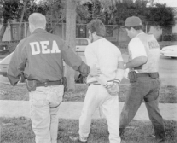
Policing_Marijuana: Should the war on drugs be continued?
The recent movement for legalizing marijuana for medical purposes has been gaining momentum. One of the biggest obstacles for proponents of marijuana's use for medicinal reasons is the immense and expensive apparatus which has been established to punish both users and sellers of marijuana. Marijuana was banned from being used as a medicine in 1937 by the passage of the Marijuana Tax Act of 1937. Since the passage of this Act, the American Government has invested billions of dollars into apprehending and prosecuting those who buy, sell, and use marijuana. Given this enormous investment of not only money but also human resources and time, it is necessary to evaluate whether or not the program(s) have been effective and if there is a more efficient means for regulating and/or eliminating the use of marijuana. In particular, given the known medical benefits derived from marijuana's use it is necessary to examine how the legalization of marijuana, particularly for medical purposes, would effect the current system and to analyze the shortcomings of the current regime.
The current structure for punishing and apprehending marijuana users has been largely ineffective in curtailing its use and has unduly burdened the criminal justice system. For example, this nation's prisons have become increasingly filled with people convicted of drug-related crimes. In California, for example, the prison population has more than tripled over the past twelve years in large part due to the increasing number of inmates who have been convicted of drug-related offenses. In New York City, close to 70% of inmates are serving sentences for drug-related crimes. Despite this increase in the number of people incarcerated for drug offenses, there has been little or no effect on drug related crimes. The arrests of major drug suppliers only has a temporary effect upon the overall drug supply and, as a result, are not effectively stopping the flow of drugs in this country. The most prominent and alarming sign of the failure of the war on drugs is the increase in drug use among adolescents and those in junior high school and college. If the war on drugs is, or should be, concerned primarily with keeping drugs from America's youth then it has been an overwhelming disappointment.
Through the legalization of marijuana many of the stated goals of the so-called war on drugs can be accomplished much more efficiently and without the great expense. If marijuana were legalized, the government could regulate drug sales and thereby decrease drug-related violence. It is clear that much of the gang related violence and homicide is related to the black-market for drugs, which would not exist if drugs were legalized. Additionally, the legalization of marijuana, particularly under government control, would undermine efforts to recruit new drug users and destroy the mystique illicit drugs hold in our society, especially among young people. Also, by legalizing marijuana, the government could dismantle the expensive and unsuccessful system of regulating marijuana use currently in place. The money that was then saved could be better spent on things such as sponsoring educational and prevention programs, sponsoring voluntary programs for drug treatment, expanding drug maintenance programs, and providing safely dispensed and inexpensive drugs. Lastly, the concern over the likely increase in the use of marijuana by teenagers does not seem statistically significant. In countries which have legalized marijuana, such as the Netherlands, there is no documented increase in the number of teenagers who smoke marijuana recreationally. In fact, the Dutch government legalized marijuana for personal consumption while maintaining a prohibition against possession and sale, the level of marijuana use decreased.
Although the subject of the legalization of marijuana is clearly controversial, there is enough evidence to suggest that marijuana should be legalized for medical purposes. There is little doubt that the current war on drugs has not been effective and needs to be re-evaluated. Despite the amount of money and resources invested into the so-called war on drugs, drug use continues to rise and our criminal justice system becomes more overburdened. The fact that the government could better control marijuana if the government legalized it, lessen the burden on the criminal justice system, and there is enough evidence to demonstrate that the legalization of marijuana will not necessarily increase drug use and may in fact decrease it among young people, marijuana should be legalized and the current system dismantled.
![]()